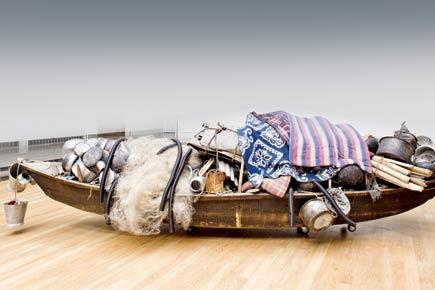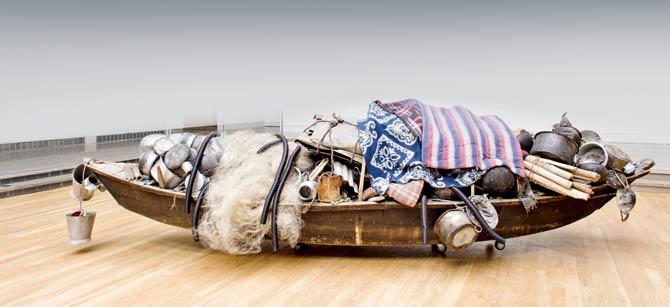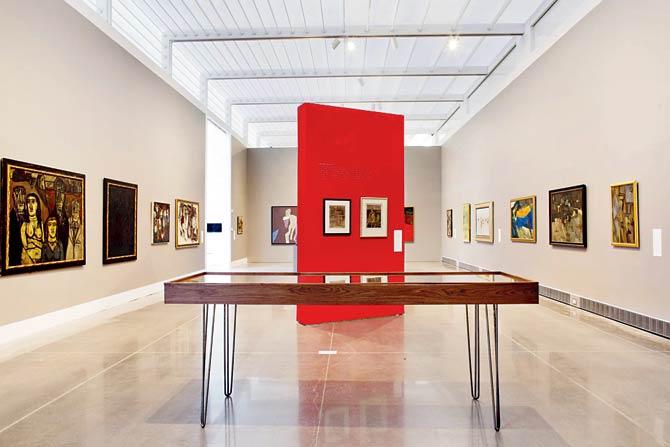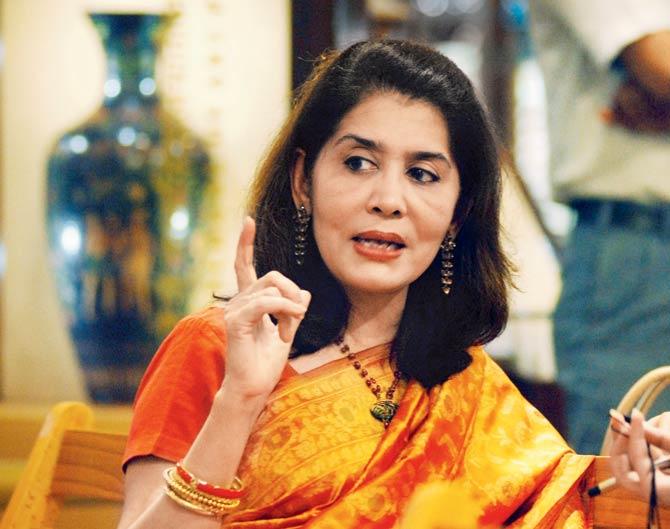With one of this year's biggest art shows arriving from New York cancelled, and funds only trickling in, is the administrative tussle at the Byculla museum robbing Mumbai of its cultural feed?

It’s Mumbai’s loss, the city’s artist community and cultural lovers are going to say.
ADVERTISEMENT

Subodh Gupta’s installation, What does the room encompass that is not in the city? (2014), was shown at the Queens Museum in March 2015 as part of After Midnight. The show was scheduled to open at Byculla’s BDL museum last month. Pic/Hai Zhang & Queens Museum
An ambitious exhibition curated by gallerist Dr Arshiya Lokhandwala that opened to critical acclaim in New York last March, and was meant to set up base at Byculla’s Dr Bhau Daji Lad Museum last month, has been cancelled. Sources say the administrative controversy surrounding the running of the iconic cultural institution could be behind the decision. The show titled, After Midnight: Indian Modernism to Contemporary India 1947 -1997 involved the works of 26 Indian artists and traced the last 50 years of the country’s art history, ranging from Modern to Contemporary.

Works by artists from the Bombay Progressive Group such as MF Husain, FN Souza and Tyeb Mehta were part of After Midnight, first shown at Queens Museum, New York. Pic/Hai Zhang Queens Museum
Since April 2015, the Brihanmumbai Municipal Corporation (BMC), under whose purvey the museum falls, has been indecisive about the role that its honorary director and museum trustee, Tasneem Zakaria Mehta, will play. That same month, a proposal was passed to revoke the 17-year agreement signed in 2003 between the BMC, the Jamnalal Bajaj Foundation and the Indian Trust for Art and Cultural Heritage. A six-month time frame was set to frame fresh regulations on the museum’s running. The tussle was essentially one involving the civic body fearing a lack of control and Mehta, due to her cutting edge initiatives, becoming the face of the institution. In January, this paper reported that it was announced at a BMC meeting that powers would now rest in a trust headed by the mayor, who belongs to Shiv Sena, the party that enjoys a majority in the civic body currently. When we had contacted Mehta, she had said it was up to the Municipal Commissioner to take the call and she was unaware of any such move. Strategic decisions, she had said, are taken by the Board of Trustees chaired by the Mayor.

Tasneem Mehta, honorary director, BDL museum
The show that could not be
After Midnight opened in March 2015 at the Queens Museum, New York, as a juxtaposition of two historical periods in Indian art – the Moderns and the Contemporaries. It was well-received by critics and visitors.
When SUNDAY mid-day had spoken to the curator last December, she said she was tweaking her exhibition to suit the Mumbai audience, and that it was scheduled to open on January 21, 2016.
A week before its opening, there was chatter in the art community about problems surrounding the exhibit. This paper had called the museum to inquire right before Mumbai Gallery Weekend (January 22-24) and a staffer had said the show was postponed. A discussion surrounding the show between Mehta and Lokhandwala at Delhi’s India Art Fair on January 31 made no mention of the cancellation.
A private email sent out last week alluded to the critical juncture the BDL was at and informed participating artists about the cancellation. When Mehta had agreed to the exhibition, circumstances had been different. She apologised for the inconvenience in the mail.
“I don’t know about the circumstances for the cancellation, but I do know that both, Tasneem Mehta and the institution have been going through an unnecessary hard time,” said Shaina Anand, participating artist. “Mehta rescued the institution and the staff takes pride in the conservation it carries out, and also in installing the contemporary art exhibitions. While it’s unfortunate that the exhibition has been cancelled, the concern is larger; it’s about how and why educational and cultural institutions are at stake.”
Insiders say it’s not just After Midnight. While educational programmes continue to run in the museum, art exhibitions have been put on hold until further notice.
In January, municipal commissioner Ajoy Mehta had said that a thorough review of the museum’s running will be put into action. Now, sources indicate that funding is getting hard to come by, and future shows and events depend on the outcome of an upcoming board meeting.
Shilpa Gupta, whose work of marble slabs referring to the unlawful killings in Kashmir, was to be exhibited at the show, said, “The situation at the museum is not easy, and one hopes that it will pass. Tasneem has been one of the few to bring contemporary art to a wider audience and we are aware of the many challenges she is facing.”
Prajakta Potnis, the youngest artist in the show, said, “It is a reflection of today’s times and it is tragic that the show got cancelled,” she said. Mithu Sen, who was to show her installation, Museum of Unbelonging at the exhibition, said, “We got to know of the cancellation over email, and we are still not sure of the exact reasons. This show celebrated India.”
The artworks are now being returned to the artists, and some being shipped back to New York. It is plain irony that a show spanning the history of Indian art could not be shown at a premier India art institution. “It is a loss that a critical exhibition like After Midnight that presented a comparative study of Indian art in the wake of two defining moments in history, a show well-received in New York, could not be shown here,” said Lokhandwala.
When we contacted Mehta, she said she didn’t wish to comment. Municipal commissioner Ajoy Mehta offered the same response after repeated attempts to reach him.
 Subscribe today by clicking the link and stay updated with the latest news!" Click here!
Subscribe today by clicking the link and stay updated with the latest news!" Click here!






